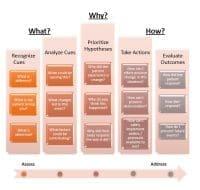Beginning your career as a nurse can present challenges. You may feel anxious and fearful. Can you adapt and progress with the tasks at hand, or do you collapse under the crippling weight of uncertainty? One thing you must learn as a new nurse is to have patience, a skill vital not only for nurses but for everyone. You must learn to take the time to do what must be done and be resilient even when things get hard or don’t go your way. I can illustrate this need from my initial experience attempting I.V. starts as a new nurse.
Journeying to start a successful I.V.
As a student nurse, I attempted and started multiple I.V. lines. I was proud of myself and felt like a real nurse after those successes. I thought it would be easy to transition that knowledge and experience as a student to my new career as a nurse. It was not.
Starting an I.V. entirely on your own for the first time can be nerve-wracking! In school, I had the support of a nurse, nurse educator, or preceptor to guide and assist me. However, as a new nurse, you’re on your own. Other licensed, very busy nurses can’t be in the room with you for every task you perform. You have to use and develop your knowledge and skill through experience. That’s a daunting concept when you’re staring at someone in a bed who expects you to start an I.V. without pain and no blood leaks, all while you act like you could do it all along. Additionally, their family is watching and possibly taking notes. No pressure.
For 3 long, arduous months, I couldn’t start an I.V. I performed the technique correctly. I got the flashback. I was in the vein. Every time I tried to start it, though, it failed. The vein would blow. I would hit a valve in the vein. The vein would be crooked. I would go through the vein. The flashback wouldn’t continue. I would go to flush, and the patient would have pain. I would start the I.V. fluid, and the site would leak. It was maddening!
Once when I told a patient how I would start an I.V. and how long it would take, they responded, “Well, if you can’t start an I.V. on me, you need to go back to school.” As you can imagine, that I.V. wasn’t successful; but no, I didn’t go back to school. As much as I loved placing an I.V. as a student, after those first 3 months, I would have rather spit on an I.V. than look at it. I couldn’t get them to start successfully, no matter what I did or how I tried to adapt. It was driving me crazy!
One day, I finally found a vein I knew I could start an I.V. on without issue. The patient was an elderly gentleman with massive veins in his wrists. I remember looking at that vein and thinking it was so thick and juicy. This is how nurses feel about veins. If we spot big ones from across the room, guard your arms. I thought to myself, “If I can’t start an I.V. in this vein, then I never will.” Finally, at long last, I started an 18-gauge I.V. needle in a patient’s arm. It flushed well, with no bulges or pain. It was beautiful. I wanted to take a picture of it. But that would have been wrong, and we didn’t have phone cameras then.
After this successful I.V., starting them became academic. I was someone others on the unit turned to for help with their patients. I’m not boasting, but I was great at it for many years. All it took was patience and resilience. Each time I failed, I never gave up. I kept adapting to what was before me and trying to succeed. Once I got over whatever issue prevented success, I never looked back. My resilience showed through due to the patience I developed from a source I could count on—my mother.
A mother’s concern
It took time for me to feel like I could be a nurse, so starting an I.V. was just one of many issues I struggled with initially. When I began my career, I was still living at home. I frequently arrived home moping. One day, I came home and sat on the couch alone and cried uncontrollably. Have you ever seen the gif of Anthony Anderson crying while lying in bed? That was me. I was crying and saying to no one in particular, “I just want to be a good nurse!” I was so scared in those early days of my career.
This caught my mother’s attention. She was concerned I might give up after all the hard work I had put in. The thought had certainly crossed my mind. Nursing was hard and scary. I felt like I was failing miserably. I also was my own worst critic. I convinced myself I couldn’t do the work of a nurse. It was too much, and I was never going to get it.
My mother saw how hard I was being on myself. One night, she asked, “Did you have a lot of patients?” I remember looking at her and thinking, “Is she serious right now?” I answered, “Yes! I have more patients than any other nurse in the hospital, Mom!” She chuckled a bit and then asked me another question, “Did you have a lot of patience?” I stared at her. It seemed, at first, that she was asking me the same question again, but she wasn’t. Instead of asking me about my number of patients, she asked me about my patience. I replied, “No, Mom, I didn’t.” She replied, “Well, I guess that’s something you can work on.” She wanted me to stop and think about what was happening in my day. I needed time to process these questions.
My perception
Did you have a lot of patients? Did you have a lot of patience? When my mom first asked me these two questions, I found them annoying. They were cutesy and quirky and funny. My mom could ask them in her goofy way, which was usually amusing. However, my mindset wasn’t in the best place at that time. I did hear the questions, though. I began to replay them in my head.
When working on the unit, I asked myself the second question more often: Do you have patience? The first question was a given because you will always have many patients. More and more, I thought about how patient I was while I worked. I paid attention to my patience with coworkers, providers, visitors, and patients. Mostly, I tried to learn to be patient with myself. My skills would get better. It was going to take time. As my experiences grew, my confidence grew. As with the I.V. starts, I developed the resilience to keep going and not give up. Patience was the key to creating that resilience.
Each time my mom asked me those two questions, the answers progressively improved. The first question never changed. I always had a lot of patients. But the second question became a resounding “Yes!”
Final thoughts
When you’re working during a busy day, try asking yourself those two questions. Did I have a lot of patients? Did I have a lot of patience? The first answer may always be yes. But as you focus on what patience constitutes, how you respond to challenges, you’ll begin to realize things can get better. You’ll slow down and think through that med pass a little longer. You’ll keep trying to start that I.V., no matter how many times you fail. You’ll learn that the worst critic you’ll ever encounter in your career as a nurse is yourself. One day, after you accept all of that, you’ll realize that you’ve had a lot of patience during a challenging day. That will be the best day of your career.
Jason Thrift is an assistant professor at Clemson University School of Nursing in Clemson, South Carolina.


















